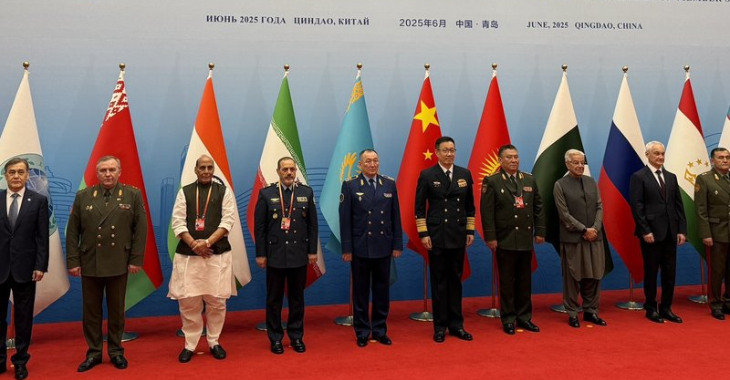In his speech at the Shanghai Cooperation Organization (SCO) Defence Ministers’ Meeting in Qingdao, China, Defence Minister Rajnath Singh urged for unified and decisive action against terrorism and the proliferation of WMDs in the hands of terrorist organizations and non-state actors.
He emphasized that terror cannot coexist with peace and prosperity and named radicalization, extremism, and a rising lack of trust as the region’s biggest problems.
“The peace, security, and trust deficit deficits are, in my opinion, the main issues facing our region. And rising radicalization, extremism, and terrorism are the main causes of these issues,” Singh stated.
The speaker emphasized that only a united and determined stance can guarantee everyone’s safety and security. “Peace and prosperity cannot co-exist with terrorism and proliferation of Weapons of Mass Destruction (WMDs) in the hands of non-state actors and terror groups,” he stated.
It is “imperative that those who sponsor, nurture, and utilize terrorism for their narrow and selfish ends must bear the consequences,” according to the defense minister.
The defense minister issued a warning, saying that countries who use cross-border terrorism as an instrument of state policy will have to pay a price.
“Some nations harbor terrorists and utilize cross-border terrorism as a tool of policy. Such double standards have no place here. He declared that the SCO should not be afraid to condemn such countries.
Singh stated, “India’s zero tolerance for terrorism is manifest today through its actions,” reinforcing the country’s zero tolerance policy. Our right to self-defense against terrorism is part of this. We’ve demonstrated that terrorist hotspots are no longer secure, and we won’t think twice about attacking them.”
Singh emphasized the necessity of international action to stop youth radicalization and stated that the SCO’s Regional Anti-Terrorist Structure (RATS) has been essential in coordinating counter-radicalization initiatives.
He went on to say that the organization’s shared commitment is reflected in the joint declaration released during India’s leadership of the SCO Council of Heads of State on “Countering Radicalization leading to Terrorism, Separatism, and Extremism.”
Singh called on member nations to take action against terrorists’ use of contemporary technology, including their use of drones to smuggle drugs and weapons.
“Traditional borders are no longer the only defenses against dangers in our globalized society. Rather, we confront a complex network of threats that include hybrid warfare, cyberattacks, and international terrorism,” he stated.
“These threats do not respect national boundaries, and they demand a unified response rooted in transparency, mutual trust, and collaboration.”
Recalling the April 22 terror assault in Pahalgam, which claimed the lives of 26 tourists slaughtered by ‘The Resistance Front’, a branch of Lashkar-e-Taiba, a UN-designated terror group based in Pakistan, Rajnath Singh stated the incident’s style was similar to earlier LeT attacks in India.
“In exercising its right to defend against terrorism and pre-empt as well as deter further cross-border terrorist attacks, India on May 7, 2025, successfully launched Op Sindoor to dismantle cross-border terrorist infrastructure,” he stated.
Singh demanded that those responsible for terrorism attacks be held accountable.
“We stress once more the importance of holding accountable and prosecuting those responsible for heinous acts of terrorism, including cross-border terrorism, as well as their organizers, financiers, and backers. Any terrorist attack, regardless of its motivation, time, location, or perpetrator, is illegal and unacceptable. “SCO members must categorically denounce this evil,” he stated.
The defense minister emphasized the value of multilateralism and India’s commitment to communication and collaboration as a means of averting wars.
“India thinks that by establishing channels for communication and cooperation, reformed multilateralism can aid in fostering international cooperation and averting conflict. Invoking the ancient Indian precept of “Sarve Jana Sukhino Bhavantu” (May all people be happy), he stated that no nation, no matter how big and strong, can manage alone.
He reaffirmed India’s unwavering commitment to Afghan peace and stability.
Our top priorities in Afghanistan right now are helping the Afghan people with their humanitarian needs and meeting the country’s overall development requirements. India continues to carry out capacity-building programs for the Afghan people as the country’s biggest regional development partner,” Singh stated.
India supports “greater cooperation and mutual trust among SCO members,” he said in closing, calling for increased collaboration among SCO members. Together, we should strive to meet the expectations and aspirations of our people while addressing the issues of the day. In order to improve stability and security in our neighborhood, we must all work together.
Read More
Today, the Axiom-4 mission will launch from the Kennedy Space Center in Florida
Tomorrow is probably when Shubhanshu Shukla will fly to the space station: NASA


